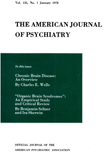ELECTROENCEPHALOGRAPHIC STUDIES OF 1,000 SCHIZOPHRENIC PATIENTS
Abstract
The literature pertinent to the problem of whether or not schizophrenics are more likely to show "abnormal" or poorly organized records is briefly reviewed.
Data collected from 1,000 schizophrenic patients with an average age of 20.4 years are contrasted with a "control" group consisting of 474 patients without discernible neurological disease, who are nonpsychotic and in a comparable age group. This reveals that 5.0% of the schizophrenic records are "abnormal" by virtue of the presence of significant amounts of slow wave activity; 8.3% of the control group also have such abnormal records.
It is concluded that changes in the EEG can result from emotional perturbation and do not necessarily indicate support for an organic genetically oriented concept of schizophrenia. There appears to be no more significant abnormality in the EEG's of schizophrenics than in those of any other patients with nonorganic disturbance in the brain.
Access content
To read the fulltext, please use one of the options below to sign in or purchase access.- Personal login
- Institutional Login
- Sign in via OpenAthens
- Register for access
-
Please login/register if you wish to pair your device and check access availability.
Not a subscriber?
PsychiatryOnline subscription options offer access to the DSM-5 library, books, journals, CME, and patient resources. This all-in-one virtual library provides psychiatrists and mental health professionals with key resources for diagnosis, treatment, research, and professional development.
Need more help? PsychiatryOnline Customer Service may be reached by emailing [email protected] or by calling 800-368-5777 (in the U.S.) or 703-907-7322 (outside the U.S.).



